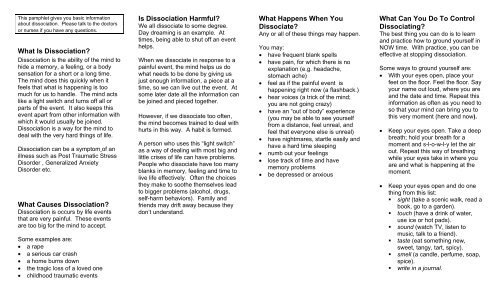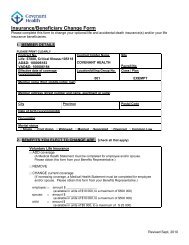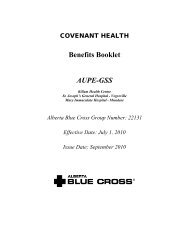What Is Dissociation? - Caritas Health Group
What Is Dissociation? - Caritas Health Group
What Is Dissociation? - Caritas Health Group
You also want an ePaper? Increase the reach of your titles
YUMPU automatically turns print PDFs into web optimized ePapers that Google loves.
This pamphlet gives you basic information<br />
about dissociation. Please talk to the doctors<br />
or nurses if you have any questions.<br />
<strong>What</strong> <strong>Is</strong> <strong>Dissociation</strong>?<br />
<strong>Dissociation</strong> is the ability of the mind to<br />
hide a memory, a feeling, or a body<br />
sensation for a short or a long time.<br />
The mind does this quickly when it<br />
feels that what is happening is too<br />
much for us to handle. The mind acts<br />
like a light switch and turns off all or<br />
parts of the event. It also keeps this<br />
event apart from other information with<br />
which it would usually be joined.<br />
<strong>Dissociation</strong> is a way for the mind to<br />
deal with the very hard things of life.<br />
<strong>Dissociation</strong> can be a symptom of an<br />
illness such as Post Traumatic Stress<br />
Disorder , Generalized Anxiety<br />
Disorder etc.<br />
<strong>What</strong> Causes <strong>Dissociation</strong>?<br />
<strong>Dissociation</strong> is occurs by life events<br />
that are very painful. These events<br />
are too big for the mind to accept.<br />
Some examples are:<br />
• a rape<br />
• a serious car crash<br />
• a home burns down<br />
• the tragic loss of a loved one<br />
• childhood traumatic events<br />
<strong>Is</strong> <strong>Dissociation</strong> Harmful?<br />
We all dissociate to some degree.<br />
Day dreaming is an example. At<br />
times, being able to shut off an event<br />
helps.<br />
When we dissociate in response to a<br />
painful event, the mind helps us do<br />
what needs to be done by giving us<br />
just enough information, a piece at a<br />
time, so we can live out the event. At<br />
some later date all the information can<br />
be joined and pieced together.<br />
However, if we dissociate too often,<br />
the mind becomes trained to deal with<br />
hurts in this way. A habit is formed.<br />
A person who uses this “light switch”<br />
as a way of dealing with most big and<br />
little crises of life can have problems.<br />
People who dissociate have too many<br />
blanks in memory, feeling and time to<br />
live life effectively. Often the choices<br />
they make to soothe themselves lead<br />
to bigger problems (alcohol, drugs,<br />
self-harm behaviors). Family and<br />
friends may drift away because they<br />
don’t understand.<br />
<strong>What</strong> Happens When You<br />
Dissociate?<br />
Any or all of these things may happen.<br />
You may:<br />
• have frequent blank spells<br />
• have pain, for which there is no<br />
explanation (e.g. headache,<br />
stomach ache)<br />
• feel as if the painful event is<br />
happening right now (a flashback.)<br />
• hear voices (a trick of the mind;<br />
you are not going crazy)<br />
• have an “out of body” experience<br />
(you may be able to see yourself<br />
from a distance, feel unreal, and<br />
feel that everyone else is unreal)<br />
• have nightmares, startle easily and<br />
have a hard time sleeping<br />
• numb out your feelings<br />
• lose track of time and have<br />
memory problems<br />
• be depressed or anxious<br />
<strong>What</strong> Can You Do To Control<br />
Dissociating?<br />
The best thing you can do is to learn<br />
and practice how to ground yourself in<br />
NOW time. With practice, you can be<br />
effective at stopping dissociation.<br />
Some ways to ground yourself are:<br />
• With your eyes open, place your<br />
feet on the floor. Feel the floor. Say<br />
your name out loud, where you are<br />
and the date and time. Repeat this<br />
information as often as you need to<br />
so that your mind can bring you to<br />
this very moment (here and now).<br />
• Keep your eyes open. Take a deep<br />
breath; hold your breath for a<br />
moment and s-l-o-w-l-y let the air<br />
out. Repeat this way of breathing<br />
while your eyes take in where you<br />
are and what is happening at the<br />
moment.<br />
• Keep your eyes open and do one<br />
thing from this list:<br />
sight (take a scenic walk, read a<br />
book, go to a garden).<br />
touch (have a drink of water,<br />
use ice or hot pads).<br />
sound (watch TV, listen to<br />
music, talk to a friend).<br />
taste (eat something new,<br />
sweet, tangy, tart, spicy).<br />
smell (a candle, perfume, soap,<br />
spice).<br />
write in a journal.
How Can Others Help You<br />
When You Dissociate?<br />
People around you may or may not<br />
know that you are dissociating. It is<br />
your job to ground yourself in the<br />
present time and place. With practice,<br />
you will not need help from others.<br />
Some things others can do to help are:<br />
• call your name and let them know<br />
you want them to do something<br />
with you (e.g., talk to you, go for a<br />
walk).<br />
• ask you to open your eyes so that<br />
you can see where you are.<br />
• remind you that right now you are<br />
safe.<br />
• remind you to ground yourself.<br />
Controlling your dissociation<br />
will help you to:<br />
• improve your memory,<br />
• be in control of your life,<br />
• be present in the moment and<br />
know what is happening, and<br />
• keep your self-respect by avoiding<br />
embarrassing behaviors.<br />
If you need immediate help,<br />
you can:<br />
• call your doctor<br />
• call <strong>Health</strong> Link – 408-5465<br />
• go to EMERGENCY at your<br />
nearest hospital.<br />
A patient describes<br />
dissociation as:<br />
“I am like a puzzle. I am the frame of<br />
the puzzle and all the pieces are parts<br />
of who I am and what I do.<br />
Sometimes the pieces fit together.<br />
Often there are spaces or a piece is on<br />
top of the frame. I need all the pieces<br />
so I can get them in place and see the<br />
whole picture.”<br />
Where can you get more<br />
information?<br />
• Ask your doctor or nurse<br />
• Call <strong>Health</strong> Link – 408-5465<br />
This pamphlet was written by the Education Committee of<br />
the Mental <strong>Health</strong> Program at the Grey Nuns Community<br />
Hospital and the Co-ordinator of Patient and Family<br />
Education, <strong>Caritas</strong> <strong>Health</strong> <strong>Group</strong>. September, 2004.<br />
Permission to photocopy as is. Reorder form #90276<br />
<strong>What</strong> is<br />
<strong>Dissociation</strong>?<br />
Information for<br />
Patients and Families<br />
Mental <strong>Health</strong> Program<br />
<strong>Caritas</strong> <strong>Health</strong> <strong>Group</strong>









